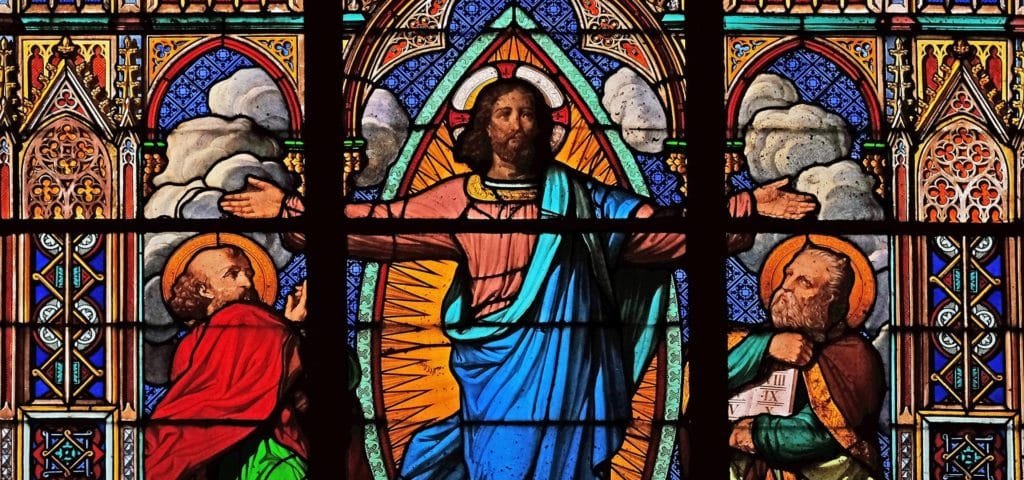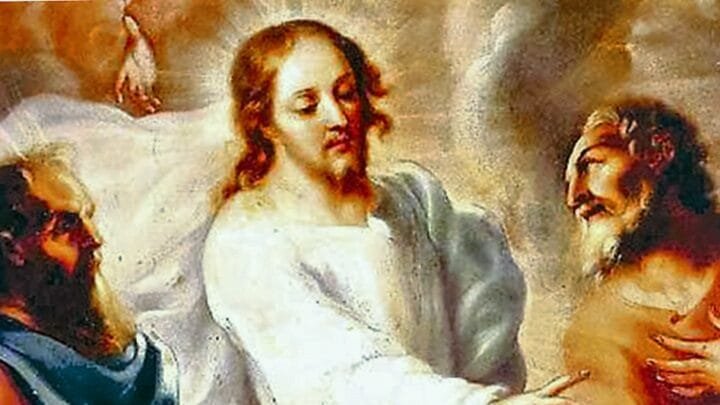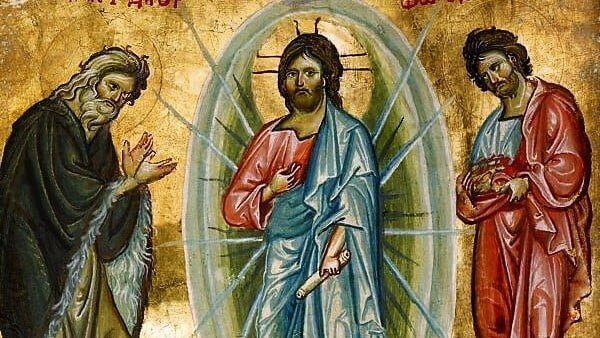POPE FRANCIS ON THE SECOND SUNDAY OF LENT YEAR A

ANGELUS
Saint Peter’s Square
Second Sunday of Lent Year A, 5 March 2023
______________________________________
Dear brothers and sisters, buongiorno!
On this Second Sunday of Lent, the Gospel of the Transfiguration is proclaimed. Jesus takes Peter, James and John with him on the mountain and is revealed to them in all his beauty as Son of God (cf. Mt 17:1-9).
Let us pause a moment over this scene and ask ourselves: Of what does this beauty consist? What do the disciples see? A special effect? No, that is not it. They see the light of God’s holiness shining on the face and on the clothing of Jesus, the perfect image of the Father. God’s majesty, God’s beauty is revealed.But God is Love. Therefore, the disciples had been beholding with their eyes the beauty and splendour of divine Love incarnate in Christ. They had a foretaste of paradise. What a surprise for the disciples! They had the face of Love before their very eyes for so long without ever being aware of how beautiful it was! Only now do they realize it with such joy, with immense joy.
In reality, through this experience, Jesus is forming them, preparing them for an even more important step. Soon after that, in fact, they would have to recognize the same beauty in him when he would mount the cross and his face would be disfigured. Peter struggles to understand: he would like to stop time, “pause” the scene, stay there and prolong this marvelous experience. But Jesus does not allow it. Indeed, his light cannot be reduced to a “magical moment”! It would thus become something false, artificial, something that would dissolve into the fog of passing sentiment. On the contrary, Christ is the light that orients our journey like the pillar of fire for the people in the wilderness (Ex 13:21). Jesus’ beauty does not alienate his disciples from the reality of life, but gives them the strength to follow him all the way to Jerusalem, all the way to the cross. Christ’s beauty is not alienating. It always brings you forward. It does not make you hide. Go forward!
Brothers and sisters, this Gospel traces a path for us too. It teaches us how important it is to remain with Jesus even when it is not easy to understand everything he says and does for us. In fact, it is by staying with him that we learn to recognize on his face the luminous beauty of love he gives us, even when it bears the marks of the cross. And it is in his school that we learn to see the same beauty on the faces of the people who walk beside us every day – family, friends, colleagues who take care of us in the most varied ways. How many luminous faces, how many smiles, how many wrinkles, how many tears and scars reveal love around us! Let us learn to recognize them and to fill our hearts with them. And then let us set out in order to bring the light we have received to others as well, through concrete acts of love (cf. 1 Jn 3:18), diving into our daily occupations more generously, loving, serving, and forgiving with greater earnestness and willingness. The contemplation of God’s wonders, the contemplation of God’s face, of the Lord’s face, must move us to the service of others.
We can ask ourselves: Do we know how to recognize the light of God’s love in our lives? Do we recognize it with joy and gratitude on the faces of the people who love us? Do we look around us for the signs of this light that fills our hearts and open them to love and service? Or do we prefer the straw fires of idols that alienate us and close us in on ourselves? The great light of the Lord and the false, artificial light of idols. Which do I prefer?
May Mary, who kept the light of her Son in her heart even in the darkness of Calvary, accompany us always on the way of love.
Source: https://www.vatican.va/content/francesco/en/angelus/2023/documents/20230305-angelus.html
ANGELUS
Saint Peter’s Square (Library of the Apostolic Palace)
Second Sunday of Lent Year A, 8 March 2020
Dear Brothers and Sisters, Good Morning,
[…] The Gospel of this second Sunday of Lent (cf. Mt 17:1-9), presents to us the account of the Transfiguration of Jesus. He takes Peter, James and John with him up a high mountain, symbol of closeness to God, to open them to a fuller understanding of the mystery of his Person, that must suffer, die and then rise again. Indeed, Jesus had begun to speak to them of the suffering, death and Resurrection that awaited him, but they were unable to accept this prospect. Therefore, once they reached the summit of the mountain, Jesus immersed himself in prayer and was transfigured before the three disciples: “his face”, says the Gospel, “shone like the sun, and his clothes became white as light” (v. 2).
Through the wondrous event of the Transfiguration, the three disciples are called to recognize in Jesus the Son of God shining with glory. Thus, they advance in their knowledge of their Master, realizing that the human aspect does not express all his reality; in their eyes the otherworldly and divine dimension of Jesus is revealed. And from on High there resounds a voice that says: “This is my beloved Son…. Listen to him” (v. 5). It is the heavenly Father who confirms the “investiture” — let us call it that — that Jesus already received on the day of his Baptism in the Jordan and invites the disciples to listen to him and to follow him.
It must be emphasized that, from among the group of the Twelve, Jesus chose to take James, John and Peter with him up the mountain. He reserved for them the privilege of witnessing the Transfiguration. But why did he select these three? Because they are the holiest? No. Yet, at the hour of trial, Peter will deny him; and the two brothers James and John will ask for the foremost places in his Kingdom (cf. Mt 20:20-23). However Jesus does not choose according to our criteria, but according to his plan of love. Jesus’ love is without measure: it is love, and he chooses with that plan of love. It is a free, unconditional choice, a free initiative, a divine friendship that asks for nothing in return. And just as he called those three disciples, so today too he calls some to be close to him, to be able to bear witness. To be witnesses to Jesus is a gift we have not deserved; we may feel inadequate but we cannot back out with the excuse of our incapacity.
We have not been on Mount Tabor, we have not seen with our own eyes the face of Jesus shining like the sun. However, we too were given the Word of Salvation, faith was given to us, and we have experienced the joy of meeting Jesus in different ways. Jesus also says to us: “Rise, and have no fear” (Mt 17:7). In this world, marked by selfishness and greed, the light of God is obscured by the worries of everyday life. We often say: I do not have time to pray, I am unable to carry out a service in the parish, to respond to the requests of others…. But we must not forget that the Baptism and Confirmation we have received has made us witnesses, not because of our ability, but as a result of the gift of the Spirit.
In the favourable time of Lent, may the Virgin Mary obtain for us that docility to the Spirit which is indispensable for setting out resolutely on the path of conversion.
Source: https://www.vatican.va/content/francesco/en/angelus/2020/documents/papa-francesco_angelus_20200308.html
EMPHASIS ADDED.

ANGELUS
Saint Peter’s Square
Second Sunday of Lent Year A, 12 March 2017
Dear Brothers and Sisters, Good Morning!
The Gospel of this second Sunday of Lent presents the narrative of the Transfiguration of Jesus. (cf. Mt 17:1-9). Taking aside three of the Apostles, Peter, James and John, He led them up a high mountain. And that is where this unique phenomenon took place: Jesus’ face “shone like the sun, and his garments became white as light” (v. 2). In this way, the Lord allowed the divine glory which could be understood through faith in his preaching and his miraculous gestures, to shine within Him. The Transfiguration was accompanied by the apparition of Moses and Elijah who were “talking with him” (v. 3).
The ‘brightness’ which characterises this extraordinary event symbolises its purpose: to enlighten the minds and hearts of the disciples so that they may clearly understand who their Teacher is. It is a flash of light which suddenly opens onto the mystery of Jesus and illuminates his whole person and his whole story.
By now decisively headed toward Jerusalem, where he will be sentenced to death by crucifixion, Jesus wanted to prepare his own for this scandal — the scandal of the Cross — this scandal which is too intense for their faith and, at the same time, to foretell his Resurrection by manifesting himself as the Messiah, the Son of God. Jesus was preparing them for that sad and very painful moment. In fact, Jesus was already revealing himself as a Messiah different from their expectations, from how they imagined the Messiah, how the Messiah would be: not a powerful and glorious king, but a humble and unarmed servant; not a lord of great wealth, a sign of blessing, but a poor man with nowhere to rest his head; not a patriarch with many descendants, but a celibate man without home or nest. It is truly an overturned revelation of God, and the most bewildering sign of this scandalous overturning, is the cross. But it is through the Cross that Jesus will reach the glorious Resurrection, which will be definitive, not like this Transfiguration which lasted a moment, an instant.
Transfigured on Mount Tabor, Jesus wanted to show his disciples his glory, not for them to circumvent the Cross, but to show where the Cross leads. Those who die with Jesus, shall rise again with Jesus. The Cross is the door to Resurrection. Whoever struggles alongside him will triumph with him. This is the message of hope contained in Jesus’ Cross, urging us to be strong in our existence. The Christian Cross is not the furnishings of a house or adornments to wear but rather, the Christian Cross is a call to the love with which Jesus sacrificed himself to save humanity from evil and sin. In this Lenten season, we contemplate with devotion the image of the Crucifix, Jesus on the Cross: this is the symbol of Christian Faith, the emblem of Jesus, who died and rose for us. Let us ensure that the Cross marks the stages of our Lenten journey in order to understand ever better the seriousness of sin and the value of the sacrifice by which the Saviour has saved us all.
The Blessed Virgin was able to contemplate the glory of Jesus hidden in his humanness. May she help us stay with Him in silent prayer, to allow ourselves to be enlightened by his presence, so as to bring a reflection of his glory to our hearts through the darkest nights.
Source: https://www.vatican.va/content/francesco/en/angelus/2017/documents/papa-francesco_angelus_20170312.html EMPHASIS ADDED.

ANGELUS
Saint Peter’s Square
Second Sunday of Lent Year A, 16 March 2014
Dear Brothers and Sisters, Good morning!
Today the Gospel presents the Transfiguration. It is the second stage of the Lenten journey: the first was the temptation in the desert, last Sunday; the second, the Transfiguration. Jesus “took with him Peter and James and John his brother, and led them up a high mountain apart” (Mt 17:1). The mountain in the Bible represents a place close to God and an intimate encounter with Him, a place of prayer where one stands in the presence of the Lord. There up on the mount, Jesus is revealed to the three disciples as transfigured, luminescent and most beautiful. And then Moses and Elijah appear and converse with Him. His face is so resplendent and his robes so white that Peter, awe-struck, wishes to stay there, as if to stop time. Suddenly from on high the voice of the Father resounds proclaiming Jesus to be his most beloved Son, saying “listen to him” (v. 5). This word is important! Our Father said this to these Apostles, and says it to us as well: “listen to Jesus, because he is my beloved Son”. This week let us keep this word in our minds and in our hearts: “listen to Jesus!”. And the Pope is not saying this, God the Father says it to everyone: to me, to you, to everyone, all people! It is like an aid for going forward on the path of Lent. “Listen to Jesus!”. Don’t forget.
This invitation from the Father is very important. We, the disciples of Jesus, are called to be people who listen to his voice and take his words seriously. To listen to Jesus, we must be close to him, to follow him, like the crowd in the Gospel who chase him through the streets of Palestine. Jesus did not have a teaching post or a fixed pulpit, he was an itinerant teacher, who proposed his teachings, teachings given to him by the Father, along the streets, covering distances that were not always predictable or easy. Follow Jesus in order to listen to him. But also let us listen to Jesus in his written Word, in the Gospel. I pose a question to you: do you read a passage of the Gospel everyday? Yes, no… yes, no… half of the time … some yes, some no. It is important! Do you read the Gospel? It is so good; it is a good thing to have a small book of the Gospel, a little one, and to carry in our pocket or in our purse and read a little passage in whatever moment presents itself during the day. In any given moment of the day I take the Gospel from my pocket and I read something, a short passage. Jesus is there and he speaks to us in the Gospel! Ponder this. It’s not difficult, nor is it necessary to have all four books: one of the Gospels, a small one, with us. Let the Gospel be with us always, because it is the Word of Jesus in order for us to be able to listen to him.
From the event of the Transfiguration I would like to take two significant elements that can be summed up in two words: ascent and descent. We all need to go apart, to ascend the mountain in a space of silence, to find ourselves and better perceive the voice of the Lord. This we do in prayer. But we cannot stay there! Encounter with God in prayer inspires us anew to “descend the mountain” and return to the plain where we meet many brothers weighed down by fatigue, sickness, injustice, ignorance, poverty both material and spiritual. To these brothers in difficulty, we are called to bear the fruit of that experience with God, by sharing the grace we have received. And this is curious. When we hear the Word of Jesus, when we listen to the Word of Jesus and carry it in our heart, this Word grows. Do you know how it grows? By giving it to the other! The Word of Christ grows in us when we proclaim it, when we give it to others! And this is what Christian life is. It is a mission for the whole Church, for all the baptized, for us all: listen to Jesus and offer him to others. Do not forget: this week listen to Jesus! And think about the matter of the Gospel: will you? Will you do this? Then next Sunday you tell me if you have done this: that you have a little book of the Gospel in your pocket or in your purse to read in little stages throughout the day.
And now let us turn to our Mother Mary, and entrust ourselves to her guidance in pursuing with faith and generosity this path of Lent, learning a little more how to “ascend” with prayer and listen to Jesus and to “descend” with brotherly love, proclaiming Jesus.
Source: https://www.vatican.va/content/francesco/en/angelus/2014/documents/papa-francesco_angelus_20140316.html EMPHASIS ADDED.
Stay updated: subscribe by email for free TO OUR NEW WEBSITE www.catholicsstrivingforholiness.org (PUT YOUR EMAIL IN THE SUBSCRIBE WIDGET).
We are also in www.fb.com/Catholicsstrivingforholiness. Kindly help more people in their Christian life by liking our page and inviting your family, friends and relatives to do so as well. Thanks in advance and God bless you and your loved ones! Fr. Rolly Arjonillo

